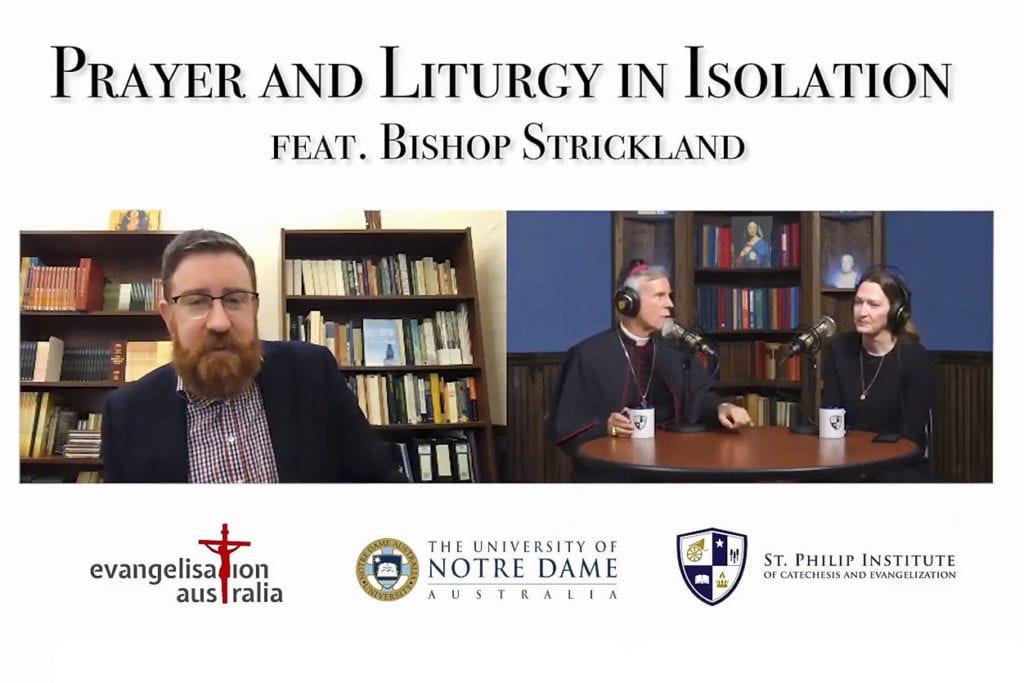
By Eric Martin
No corner of the world has gone untouched by COVID-19 and it was the spiritual fallout of the virus, the result of Churches being closed and communal gatherings banned, that was the focus of the recent webinar – “Prayer and Liturgy in Isolation” – targetting what Catholics can do to keep their faith alive and vibrant at home.
The University of Notre Dame Australia (UNDA) Fremantle Campus Ministry Manager Tom Gourlay opened the forum by asking “What does a real active Catholic life in between the sacraments look like?”
Mr Gourlay was joined by fellow panellists Executive Director of the St Philip Institute of Catechesis and Evangelization (stet), Texas USA, Dr Stacy Trasancos PhD and Bishop Joseph Strickland, Bishop of Tyler, Texas.
“Christianity is an encounter with a person, the person of Jesus Christ, and I think we can frame everything within that context: the source and the summit is an encounter with Jesus Christ who is God incarnate – in the flesh – and I think that we have hungered for that incarnate encounter during this time,” Bishop Strickland replied.
“In the Church’s view, life is the liturgy and there are different elements of it that can be experienced throughout your day, throughout the week, and hopefully you can ‘tune in’ to those things that bring the ‘holy’ into your home, because that’s where you are,” he explained.
“The idea of spiritual communion, the simple prayers that you can offer: that’s something I’ve seen that I hope people will grab onto – that nugget of goodness and holiness.
He pointed out that many people could not attend Mass during the week but still maintained their relationship with God by making an effort to devote time daily to spiritual communion, to pause and really be in communion with the Lord in the Blessed Sacrament, even though they were not physically receiving the Host.
“I think there’s a great a great spiritual heritage there that’s been rekindled for people because they aren’t able to receive the Body of Christ as physical bread.”
Bishop Strickland also highlighted the the importance of sacramentals, the kind of elements that are not pure Sacraments of the Church but include things such as images and remembrances of the saint.
“And they are reminding us that it’s [our faith’s] woven into nearly every aspect of our lives,” Bishop Strickland said.
“I’ve been encouraging and trying to remind myself of the blessing before meals [grace] is something a lot of families celebrate, but especially this time, a little bit of extra prayer time is the blessing after meals; using that same idea of the source and the summit, but to frame a family gathering around the table for a meal with an opening and a closing prayer.”
“I think there’s a lot of benefit from that. I would encourage you to be intentional about that and find things that are particularly meaningful for your family.”
In fact, the webinar pointed out, despite the stresses and strain associated with lockdown restrictions and social distancing, there are a number of emphatic positives to emerge from the pandemic.
“It made me realise that I took Mass for granted,” Dr Trasancos said.
“We’re united in our suffering for and in our longing for the Sacraments but also, I don’t think we need to be in too much despair; you have to stay aware of the fact that this will pass – a better approach would be to say ‘what can we learn from this?’,” she explained.
“When we get back to being able to celebrate our faith like we are used to doing, we’re just going to be so happy! I hope that my kids will be able to look back at this time and realise that they learned to appreciate the things that we can take for granted.
“I would hope that we have all gained that appreciation that technology may make it so that we are able to connect, but it’s never going to replace being there in the room together with someone: you cannot have long distance relationships your whole life.”
And in a question highly relevant for Australian families, the topic of what is considered appropriate behaviour for a Catholic when watching Mass on a screen was raised: “Do I stand, should I kneel or should I sit? What’s actually appropriate?”.
“I’m encouraged that they entered into the positions of standing, kneeling and sitting, just to feel a little more physically present, even though they weren’t actually there in the same room,” Bishop Strickland said.\
“And I think especially for the children, families found it meaningful and the children were more focussed because they were doing the typical things that they would do at Mass in the Church.”